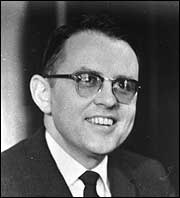FBI reopens investigation into murder of James Reeb
Forty-six years after death of Unitarian Universalist minister in Selma, investigators seek new evidence in unsolved case.
Reeb’s daughter, Anne, said an FBI agent called family members months ago and informed them the March 11, 1965, killing was being pursued again.
“They did think the case was doable, but we never heard how,” she said. “We are just waiting on that.”
Reached at his office in Selma, District Attorney Michael Jackson confirmed the FBI is actively investigating the case, saying he met with FBI officials at his office in the Dallas County Courthouse in late 2010.
He said he and agents had a wide-ranging discussion about the case, but that he could not address the specifics. “The feds are investigating this, I can tell you that,” said Jackson. “But who they are looking at, well, I can only say they are investigating it.”
The Rev. Clark Olsen, a fellow UU minister who witnessed the killing, welcomed news of the reinvestigation. He said he would be willing to testify again in the case, “but not without trepidation.”
Justice Department officials did not comment.
In 1965, three men—Elmer Cook, William Stanley Hoggle, and Namon O’Neal Hoggle—were tried for murder, but the all-white jury acquitted the trio, despite testimony identifying the attackers.
A fourth man indicted, R.B. Kelley, was never prosecuted. He gave authorities the names of those he said attacked the ministers. He denied playing a role himself, but police found a club in his car, according to FBI records.
At least one of those men, Namon O’Neal “Duck” Hoggle, is alive.
Decades later, questions remain about the fairness of the trial. One juror, Harry Vardaman, was the brother of a key defense witness, Ben Vardaman. During jury selection, the judge refused to dismiss two white potential jurors who admitted they despised white civil rights workers for sharing meals with black Southerners.
All 13 black potential jurors were struck from the panel, causing the jury to be all white.
During the trial, defense lawyer Joe Pilcher suggested to jurors that “certain civil rights groups have to have a martyr, and they were willing to let Reeb die.”
In March 1965, Reeb, 38, traveled to Alabama in response to the Rev. Dr. Martin Luther King Jr.’s invitation to ministers to join the Selma to Montgomery March. So did his friends and fellow Unitarian Universalist ministers, Olsen and the Rev. Orloff Miller.
On the night of March 9, the three white ministers had just finished dinner in downtown Selma at Walker’s Cafe, a historically black restaurant that had also opened its doors to white patrons.
The trio was heading back to Brown Chapel A.M.E. Church, where those involved with the march were meeting.
As they walked down the sidewalk, a gang of white men saw them and began crossing the street. “Hey, you n——s,” one man called out to the preachers.
The ministers picked up their pace, and Olsen said they whispered to each other, “Just keep walking.”
The gang caught them from behind. Olsen said he saw Cook smash a club over Reeb’s head. The rest of the gang joined in, slugging and kicking the ministers.
When the attack ended, one gang member yelled, “Now you know what it is like to be a real n——.”
Reeb, a father of four from Boston, was taken to a hospital, where he died March 11. National news media covered the story for several days.
Days after Reeb’s death, President Lyndon B. Johnson introduced the Voting Rights Act of 1965.
“At times, history and fate meet at a single time in a single place to shape a turning point in man’s unending search for freedom,” Johnson declared. “So it was at Lexington and Concord. So it was a century ago at Appomattox. So it was last week in Selma, Alabama. There, long suffering men and women peacefully protested the denial of their rights as Americans. Many of them were brutally assaulted. One good man—a man of God—was killed.”
Reprinted by permission of the Anniston (Ala.) Star and the Jackson (Miss.) Clarion-Ledger. This story was reported by Jerry Mitchell and John Fleming and written by Mitchell. Fleming, the Star’s editor at large, and Mitchell are founding members of the Civil Rights Cold Case Project, which brings together investigative reporters and documentary filmmakers to uncover the stories behind unsolved civil rights murders in the South. The project is affiliated with the Center for Investigative Reporting, the nation’s oldest nonprofit investigative news organization, and Paperny Films, a documentary film company in Vancouver, British Columbia.
See sidebar for links to related resources, including UU World’s extensive coverage of Reeb’s place in U.S. civil rights history.
Comments powered by Disqus







